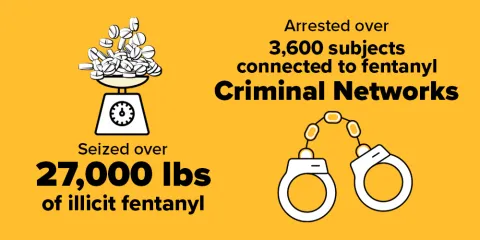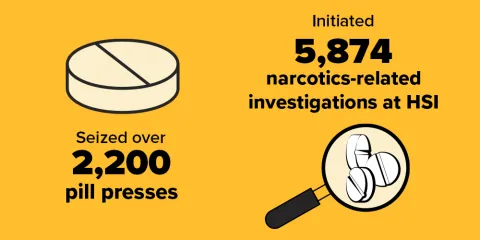DHS is on the frontlines fighting against cartels and Transnational Criminal Organizations (TCOs) that are flooding our communities with illicit synthetic drugs, like fentanyl.
Fiscal Year 2024 Year to Date Highlights:
Data applies to October 1, 2023, to June 30, 2024.
DHS, through its component agencies U.S. Customs and Border Protection (CBP) and Homeland Security Investigations (HSI) and in coordination with Intelligence & Analysis (I&A) and the Science & Technology Directorate (S&T), has stopped more illicit fentanyl and arrested more individuals for fentanyl-related crimes in fiscal years 2022 and 2023 than in the previous five years combined. We are doing this through enforcement actions, including seizures of fentanyl and precursor chemicals, along with stopping southbound guns and money, and supporting prosecutions to prevent future illicit acts.
DHS and its components are focused on enforcement actions, partnerships, technologies, and capacity-building in four areas:
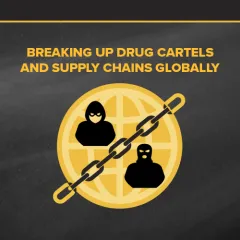
DHS is leading the federal effort to combat fentanyl internationally, through information-sharing, multinational enforcement operations, and global cooperation and partnerships.
Recent Efforts
- In April 2024, CBP launched Operation Plaza Spike to target plaza bosses and cartels that facilitate the flow of fentanyl and its precursors. In July 2024, CBP expanded the operation to El Paso and Juarez.
- In June 2024, HSI indicted 47 alleged members of an Imperial Valley-based, Sinaloa Cartel-linked fentanyl distribution network; and in July, HSI helped execute the arrest on U.S. soil of the de facto head of the Sinaloa Cartel.
- Under President Biden’s leadership, the U.S. has stepped up counternarcotics cooperation with key government partners, including China, India, Mexico, and Canada – and launched the Global Coalition to Address Synthetic Drug Threats, which unites more than 140 countries in the fight against drug trafficking cartels and illicit finance.
- DHS participates in the National Security Council-led Counternarcotics Working Group with China to disrupt the manufacture and flow of illicit synthetic drugs, delivering on the commitments made during President Biden’s meeting with President Xi in November 2023.
- DHS also contributes to the Trilateral Fentanyl Committee with the Governments of Mexico and Canada.
- HSI partners with vetted foreign law enforcement officials and prosecutors in Transnational Criminal Investigative Units (TCIUs), which support investigations and prosecutions abroad. HSI has established 16 TCIUs worldwide. In FY 2023, efforts by the Mexico TCIU resulted in the seizure of 64,138 pounds of precursor chemicals and more than 59 criminal arrests.
- We are working with shippers and private industry to provide more data to CBP. The Section 321 Data Pilot helps us work more closely with non-traditional trade partners to identify and interdict illicit shipments in small packages, without inhibiting cross-border e-commerce.
- DHS has partnered with countries like the United Kingdom, Netherlands, Belgium, France as well as New Zealand and Australia in addition to Europol and Interpol to share information and intelligence to disrupt illicit movement of precursor chemicals.
- DHS participates in World Customs Organization (WCO) meetings to advocate for the issuance of global customs policy standards and practices relating to synthetic drugs, consistent with those established by and in conjunction with the United Nations Office of Drugs and Crime (UNODC) and/or the International Narcotics Control Board (INCB).
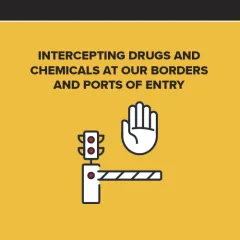
DHS personnel is on the front lines to detect and prevent fentanyl and its precursor chemicals from flowing into our country.
More than 90% of interdicted fentanyl is stopped at Ports of Entry (POEs), where cartels attempt to smuggle it primarily in vehicles driven by U.S. citizens. CBP and HSI throughout the past two years have run operations that mobilized hundreds of personnel – CBP officers, special agents, import specialists, and intelligence analysts – through surges and deployments at Southwest Border POEs, airports, express consignment facilities, international mail facilities, container stations, and warehouses across the country.
- Launched in October 2023, in Southern California, Operation Apollo is a CBP counter-fentanyl operation that disrupts drug and chemical supplies, collects and shares intelligence, and leverages valuable state and local law enforcement partnerships. Operation Apollo expanded into Arizona in April 2024. In July, CBP announced Operation Apollo X to expand that kind of collaboration to El Paso, Texas.
- Other recent operations include:
- Operation Blue Lotus, launched in March 2023, surged CBP and HSI resources to Southwest Border POEs and worked with state, local, Tribal, and territorial partners to expose networks. Operation Four Horsemen was a complementary United States Border Patrol (USBP) operation to stop fentanyl between POEs and at checkpoints near the border. As a result of these two operations, DHS seized nearly 10,000 pounds of fentanyl, and more than 10,000 pounds of other narcotics like cocaine and methamphetamines.
- Operation Artemis, a collaboration between CBP and HSI, targeted the illicit fentanyl supply chain, leveraging multidisciplined interagency "jump teams" at strategic locations. The four months Operation Artemis led to over 900 seizures, including over 13,000 pounds of fentanyl precursor chemicals.
- Operation Rolling Wave surged inbound inspections at Southwest Border checkpoints, covering every sector and employing predictive analysis and intelligence sharing.
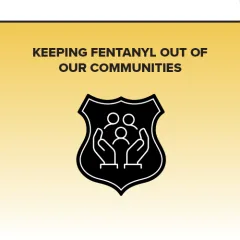
DHS is partnering with federal, state, and local stakeholders to share information and track and disrupt fentanyl networks within our communities. In addition to collaborations like those described in Operation Apollo above, DHS works with state, local, territorial, and tribal partners in a variety of ways:
- DHS is a department of partnerships, and sharing information with state, local, tribal, and territorial law enforcement and community partners is fundamental to our efforts. State, local, tribal, territorial, and international law enforcement are also in integral part of the success of DHS task forces, most significantly HSI’s Border Enforcement Security Task Force (BEST). The primary mission of HSI’s BEST is to combat emerging and existing TCOs by employing the full range of federal, state, local, tribal, and international law enforcement authorities and resources in the fight to identify, investigate, disrupt, and dismantle these organizations at every level of operation. BESTs eliminate the barriers between federal and local investigations (access to both federal and state prosecutors) and close the gap with international partners in multinational criminal investigations.
- State, local, tribal, and territorial law enforcement also support efforts to disrupt TCOs by nominating individuals to the Transnational Organized Crime (TOC) watchlist through DHS Office of Intelligence and Analysis (I&A). The TOC watchlist, maintained by the FBI, is a list of individuals known or reasonably suspected to be involved in transnational organized crime.
- Every year, DHS provides a significant level of support through preparedness grants to help state, local, tribal, and territorial governments, nonprofit agencies, and the private sector. Among those grants, Operation Stonegarden provides tens of millions of dollars to enhance cooperation among law enforcement agencies to jointly enhance security along the United States land and water borders. In the last four fiscal years, DHS has provided on average nearly $90 million per year to community partners through Operation Stonegarden.
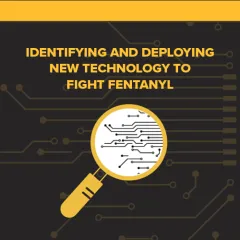
DHS is working on developing new technology to support better detection and apprehension of synthetic drugs and their precursors.
- Non-Intrusive Inspection: We are dramatically expanding non-intrusive inspection (NII) technology at our southwest border to screen and detect not only drugs, but also currency, guns, ammunition, and illegal merchandise, as well as people being smuggled or trafficked into the country, while minimally impacting the flow of legitimate travel and commerce. By installing 123 new large-scale scanners at multiple POEs along the southwest border, CBP will increase its inspection capacity of passenger vehicles from two percent to 40 percent, and of cargo vehicles from 17 percent to 70 percent.
- Forward Operating Laboratories: CBP is operating 16 Forward Operating Laboratories to provide onsite, rapid testing for fentanyl to frontline personnel. A process that once would have taken weeks now takes seconds for quicker law enforcement actions, prosecutions, and intelligence collection.
- Artificial Intelligence and Machine Learning at Ports of Entry: CBP is innovating with the responsible use of Artificial Intelligence at our POEs. This year alone, machine learning models that help CBP Officers determine which suspicious vehicles and passengers to refer to secondary screening have led to 240 seizures, which include thousands of pounds of cocaine, heroin, methamphetamine, and fentanyl.
- HSI Strategic Network Dismantlement Project: HSI is using Artificial Intelligence to illuminate fentanyl networks, known and unknown to authorities, operating throughout the U.S. and abroad. The HSI Strategic Network Dismantlement Project partners data engineers and data scientists with HSI investigators who leverage the HSI-owned RAVEN platform to analyze raw data, derive meaningful investigative insights, and enable disruptions of the global fentanyl supply chain.
- HSI Innovation Lab: HSI is utilizing the HSI Innovation Lab to provide data analytics and cutting-edge technologies (machine learning and artificial intelligence) to combat fentanyl.
Despite our progress, our efforts require action from Congress. This Administration is seeking legislation in Congress to increase penalties on those who bring deadly drugs into our communities and close loopholes that drug traffickers exploit. The "Detect and Defeat" Counter-Fentanyl legislative proposal would give border officials the tools they need to more effectively track and target the millions of small-dollar shipments that cross our borders – closing a loophole that drug traffickers exploit.
- April 2, 20245: CBP Officers Intercept Smuggler Carrying Fentanyl Inside His Body | CBP.gov
- March 28, 2025: Father, Son Arrested on Fentanyl Trafficking, Gun Sales and Immigration Violations Following ICE, Multiagency Investigation| ICE.gov
- March 27, 2025: CBP Officers Nab Teen Smuggling Methamphetamine and Fentanyl| CBP.gov
- March 20, 2025:Coast Guard Offloads Over $517.5 Million in Illicit Drugs Interdicted in Eastern Pacific Ocean| USCG.mil
- March 20, 2025:Back-to-Back Busts: U.S. Border Patrol Hits Drug Smugglers Hard in 24-hour Takedown| CBP.gov
- March 13, 2025: ICE Investigation Nets 2 Sentences for Men’s Roles in Operating Fentanyl Drug Mill | ICE.gov
- March 4, 2025: Houston Resident Heads to Prison for Trafficking Fentanyl in Hidden Compartment Following ICE Rio Grande Valley, Federal Partner Investigation | ICE.gov
- February 27, 2025: CBP Officers Interdict Attempted Smuggling of a Mixed Load Containing Fentanyl, Cocaine, Heroin and Methamphetamine in Vehicle Floor | CBP.gov
- February 24, 2025: U.S. Border Patrol Seizes Over 160 Pounds of Narcotics Worth More than $1.2 Million in Two Major Busts
| CBP.gov - February 12, 2025: Seattle CBP officers seize more than 1 pound of fentanyl | CBP.gov
- February 10, 2025: ICE Denver Arrests Honduran Alien with Firearm, Drug Charges | ICE.gov
- February 3, 2025: HSI Newark Investigation Leads to Conviction of New Jersey Man on Financial Crimes and Trafficking Fentanyl-related Substances | ICE.gov
- January 31, 2025: HSI Tucson, DEA, U.S. Marshals Arrest 2 Illegal Aliens Previously Convicted for Aggravated Felonies | ICE.gov
- January 24, 2025: HSI San Diego, Multiagency Case Sends Trafficker to 19.5 Years in Prison for Supplying Weapons and Ammunition to Sinaloa Cartel | ICE.gov
- January 17, 2025: Jacksonville Man Sentenced for Trafficking Fentanyl, Other Narcotics | HSI.gov
- January 17, 2025: HSI Laredo, Federal Partners Investigation Results in a South Texas Dealer Facing Prison Time for Selling Fentanyl to a Teenager Resulting in Death | HSI.gov
- January 16, 2025: Prior Felon Receives 16-Year Sentence on Fentanyl, Gun Charges After HSI Buffalo Investigation | HSI.gov
- January 13, 2025: CBP Issues Notice of Proposed Rulemaking to Enhance Enforcement as to Low-Value Shipments | CBP.gov
- December 19, 2024: DHS S&T Announces Award to Pacific Northwest National Laboratory for Counter-Fentanyl Efforts
- December 19, 2024: 2 Drug Trafficking Organization Members Plead Guilty to Fentanyl Analogue Distribution Following HSI Newark Investigation | HSI.gov
- December 18, 2024: San Diego Sector Border Patrol continues to seize cocaine, arrest smugglers and scouts | CBP.gov
- December 12, 2024: Massachusetts Man Pleads Guilty to Multiple Drug Offenses After Selling Drugs to an Undercover Officer | HSI.gov
- December 10, 2024: Border Patrol agents seize nearly 5 pounds of fentanyl after short pursuit | CBP.gov
- December 6, 2024: HSI Milwaukee Investigation Lands Wisconsin Man a 16-Year Sentence for Possessing Fentanyl Intended for Distribution | HSI.gov
- December 4, 2024: Memphis Man Sentenced for Possession of Fentanyl, Multiple Firearms | HSI.gov
- December 4, 2024: Jury Finds Ohio Man Guilty on All Charges, Including Murdering 3 Victims, Directing Others to Dismember and Bury 2 of the Bodies Following HSI Columbus Investigation | HSI.gov
- December 2, 2024: CBP Officers intercept and seize a large quantity of deadly fentanyl pills | CBP.gov
- November 26, 2024: CBP officers at San Ysidro Port of Entry discover fentanyl and cocaine hidden in non-factory compartments within vehicle seats | CBP.gov
- November 26, 2024: U.S. Border Patrol's San Diego Sector stops suspected fentanyl smuggler | CBP.gov
- November 25, 2025: HSI: Fort Myers Man Sentenced to Prison for Distributing Fentanyl
- November 22, 2024: CBP Recognizes Outstanding Employees During Annual Awards Ceremony | CBP.gov
- November 19, 2024: El Paso CBP officers stop internal cavity drug smugglers | CBP.gov
- November 18, 2024: Norfolk CBP Officers Intercept Dangerous Fentanyl in Export Vehicle Container Destined to Sierra Leone | CBP.gov
- November 14, 2024: HSI Los Angeles, Multiagency Investigation Results in Chinese Chemical Company, Senior Leaders Indicted for Suspected Fentanyl Manufacturing, Distribution | HSI.gov
- November 13, 2024: HSI Miami-Fort Pierce Investigation Leads to Sebring Man Sentenced to 22 Years in Prison for Fentanyl Possession | HSI.gov
- November 12, 2024: Statement from Senior Official Performing the Duties of the Commissioner Troy A. Miller on the Results of a Multi-Agency Counter Fentanyl Operation | CBP.gov
- November 7, 2024: HSI Calexico, Border Patrol Case Results in 48 Defendants Charged in Imperial Valley Takedown of Drug Trafficking Network Linked to Sinaloa Cartel
November 6, 2024: HSI Seattle Operation Leads to 12 Indictments in Connection With Violent Drug Trafficking Organization - October 31, 2024: Suspected smugglers' attempts fall short as CBP officers interdict fentanyl pills and ammunition | CBP.gov
- October 29, 2024: U.S. Border Patrol's San Diego Sector continues to intercept drugs with three significant seizures last week | CBP.gov
- October 28, 2024: CBP officers seize over $438K in mixed narcotics at Eagle Pass Port of Entry | CBP.gov
- October 22, 2024: CBP Releases September 2024 Monthly Update | CBP.gov
- October 22, 2024: California Man Admits Fentanyl Distribution After HSI Newark Investigation
- October 22, 2024: 10 Indicted Following HSI investigation Into Massachusetts-Based Drug Trafficking Organization
- October 17, 2024: New York Man Receives 13-Year Sentence for Role in 2 Bronx Drug Mills, Causing Death of Toddler, Following HSI Newark Investigation
- October 15, 2024:ERO Boston arrests Dominican national convicted of drug charges in Massachusetts | ICE.gov
- October 15,2024:CBP officers seize over 122 pounds of blue fentanyl pills concealed throughout vehicle | CBP.gov
- October 2, 2024: Port of San Luis CBP Officers arrest teen with $1 Million of Narcotics | CBP.gov
- October 1, 2024: HSI New York, Federal Partners Announce Charges Against 18 Defendants in Scheme to Manufacture, Distribute Millions of Deadly Counterfeit Pharmaceuticals Through Fake Online Pharmacies
- September 27, 2024: HSI New York Investigation Lands Long Island Drug Dealer 17 Years in Prison for Distributing Fentanyl That Caused Death of Suffolk County Man
- September 24, 2024: HSI joins U.S. Department of the Treasury in Announcing Sanctions Against Individuals and Businesses Connected to Colombian and Mexican Transnational Criminal Organizations
- September 23, 2024: CBP Officers Seize Over 100 Pounds of Blue Fentanyl Pills Concealed Throughout Vehicle | CBP.gov
- September 20, 2024: Second Significant Fentanyl Seizure in Two Weeks for U.S. Border Patrol's San Diego Sector | CBP.gov
- September 18, 2024: 2 Charged with Fentanyl Trafficking Following HSI Laredo, Federal Partner Investigation
- September 13, 2024: DHS Workforce on the Frontlines of Biden-Harris Administration’s New Executive Actions to Address Surge in De Minimis Shipments and Protect American Consumers, Workers, and Businesses | CBP.gov
- September 11, 2024: DHS Workforce Reflects on Sept. 11: Dr. Laura Parker
- September 6, 2024: Florida Man Gets Life for Fentanyl Distribution, Sex Trafficking
- September 6, 2024: San Diego Sector Border Patrol Seizes Fentanyl on Interstate 8 | CBP.gov
- September 5, 2024: Port of San Luis CBP Officers Bust Fentanyl and Meth Smuggling Attempts | CBP.gov
- August 29, 2024: San Ysidro Port of Entry Seizes Over One Ton of Narcotics in the Month of July | CBP.gov
- August 28, 2024: CBP Officers at Port of San Luis Intercept Fentanyl Methamphetamine Loads | CBP.gov
- August 22, 2024: CBP Officers Seize Fentanyl Meth in Arizona | CBP.gov
- August 21, 2024: Statement from Acting Commissioner Troy A. Miller on National Fentanyl Prevention and Awareness Day | CBP.gov
- August 16, 2024: CBP Releases July 2024 Monthly Update | CBP.gov
- August 15, 2024: CBP Finds Fentanyl in a Flatbed Trailer | CBP.gov
- August 14, 2024: 4 Charged With Drug Trafficking, Firearms Offenses
- August 13, 2024: Minnesota Man Pleads Guilty to Possessing More Than 2,000 Fentanyl Pills
- August 6, 2024: HSI Laredo, Multiagency Investigation Results in Third Person Charged With Selling Fentanyl Resulting in Death
- August 1, 2024: CBP officers in Arizona seize more than half a ton of fentanyl in largest seizure in agency history | CBP.gov
- July 31, 2024: Readout of President Joe Biden’s Briefing on Ongoing Work to Combat Illicit Fentanyl | Whitehouse.gov
- July 31, 2024: FACT SHEET: Biden-Harris Administration Announces New Actions to Counter the Scourge of Fentanyl and Other Synthetic Drugs| Whitehouse.gov
- July 31, 2024: Fact Sheet: DHS Shows Results in the Fight to Cripple Cartels and Stop Fentanyl from Entering the U.S.
- July 30, 2024: CBP officers seize $553K in mixed narcotics at Eagle Pass Port of Entry | CBP.gov
- July 25, 2024: Statement from Secretary Mayorkas on Arrest of Alleged Leaders of Sinaloa Cartel
- July 25, 2024: CBP officers intercept purple fentanyl powder in two separate smuggling attempts | CBP.gov
- July 22, 2024: ICYMI: CBP Announces Expanded Operations Targeting Transnational Criminal Organizations | CBP.gov
To report suspicious criminal activity related to narcotics smuggling, call the HSI Tip Line at 1-877-4-HSI-TIP.

